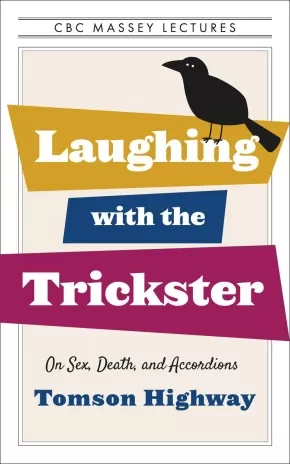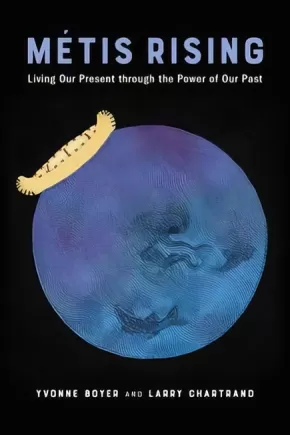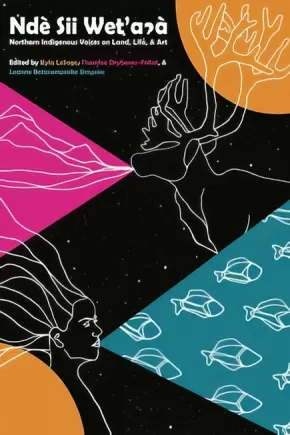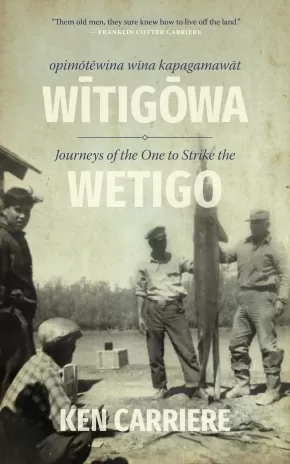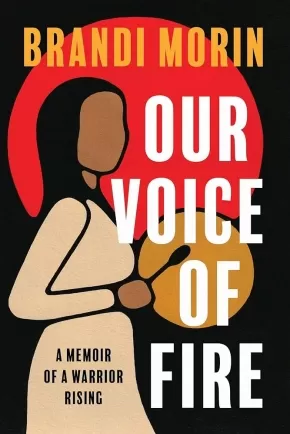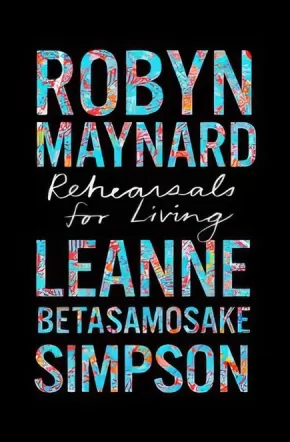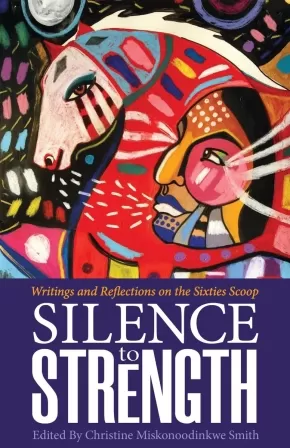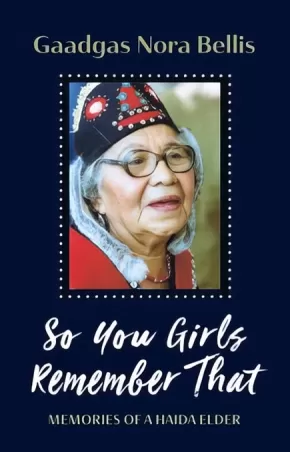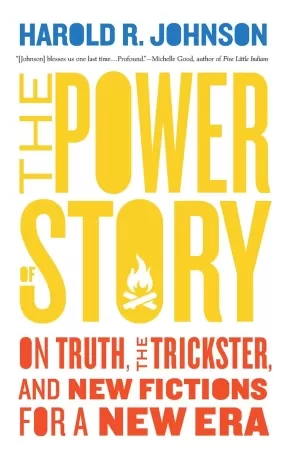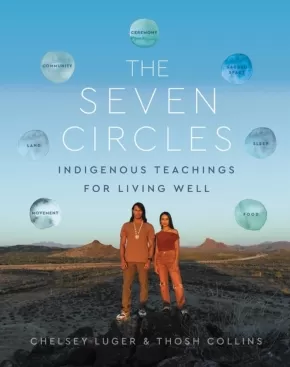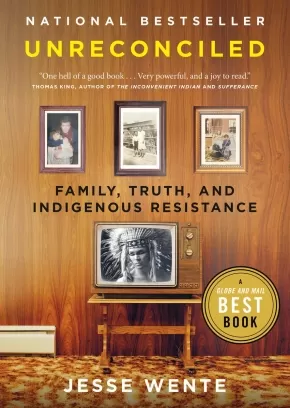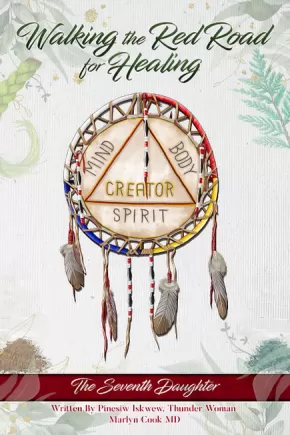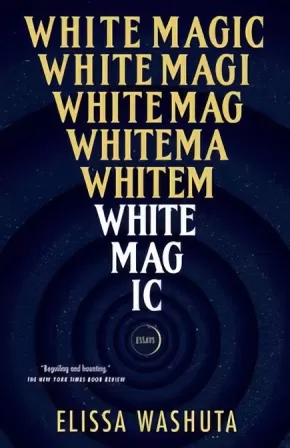
Personal Narratives
46
-
60
of
116 Results;
Sort By
Go To
of 8
Kwändǖr
$25.00
Format:
Paperback
Text Content Territories:
Indigenous Canadian; First Nations; Dene; Tahltan (Nahanni);
Reading Level: N/A
ISBN / Barcode: 9781772620771
Synopsis:
Synopsis:
Indigenous Voices Award winner Cole Pauls returns with a robust collection of stories that celebrate the cultural practices and experiences of Dene and Arctic peoples. Gathering Pauls's comics from magazines, comic festivals and zine making workshops, these comics are his most personal work yet. You'll learn stories about the author's family, racism and identity, Yukon history, winter activities, Southern Tutchone language lessons and cultural practices. Have you ever wanted to learn how to Knuckle Hop? or to acknowledge and respect the Indigenous land you’re on? Or how to be an ally to Indigenous people? Well, gather around and hear this Kwändǖr! (Story!).
Additional Information
140 pages | 6.50" x 10.00" Paperback
Laughing with the Trickster: On Sex, Death, and Accordions
$22.99
Format:
Paperback
Text Content Territories:
Indigenous Canadian; First Nations; Cree (Nehiyawak);
Reading Level: N/A
ISBN / Barcode: 9781487011239
Synopsis:
Synopsis:
Brilliant, jubilant insights into the glory and anguish of life from one of the world’s most treasured Indigenous creators.
Trickster is zany, ridiculous. The ultimate, over-the-top, madcap fool. Here to remind us that the reason for existence is to have a blast and to laugh ourselves silly.
Celebrated author and playwright Tomson Highway brings his signature irreverence to an exploration of five themes central to the human condition: language, creation, sex and gender, humour, and death. A comparative analysis of Christian, classical, and Cree mythologies reveals their contributions to Western thought, life, and culture—and how North American Indigenous mythologies provide unique, timeless solutions to our modern problems. Highway also offers generous personal anecdotes, including accounts of his beloved accordion-playing, caribou-hunting father, and plentiful Trickster stories as curatives for the all-out unhappiness caused by today’s patriarchal, colonial systems.
Laugh with the legendary Tomson Highway as he illuminates a healing, hilarious way forward.
Additional Information
200 pages | 5.00" x 8.00" | Paperback
Making a Chaputs: The Teachings and Responsibilities of a Canoe Maker
$24.95
Format:
Paperback
Text Content Territories:
Indigenous Canadian; First Nations; Nuu-chah-nulth (Nootka); Tla-o-qui-aht First Nation;
Reading Level: N/A
ISBN / Barcode: 9780772680273
Synopsis:
Synopsis:
A rich visual testament to the practical and cultural power of the dugout canoe, balanced in its description of meaning and method.
Tla-o-qui-aht master canoe maker Joe Martin, in collaboration with former museum curator Alan Hoover, describes the meaning and method behind one of the most vivid and memorable symbols of the Northwest Coast: the dugout canoe. Both artform and technological marvel, the chaputs carries Indigenous cultural knowledge passed down through generations, not only of the practical forestry and woodworking that shape every canoe, but also of the role and responsibilities of the canoe maker.
The text includes both a step-by-step explanation of the canoe-making process from tree selection onward (carefully described and dynamically illustrated) and the personal histories of a number of Joe's canoes, encompassing their planning, creation, cultural significance and role in the process of reconciliation. The teachings Joe received from his father and the expertise he has gained in a lifetime of canoe-making are recorded here in his own words for generations to come.
Reviews
“In Making a Chaputs, Nuu-chah-nulth canoe artist Joe Martin shows how he carves dugout canoes, explaining how and why he makes two full-size canoes from a single cedar log. It is a clever, amazing tradition rooted in deep respect for the forest and a lifetime of Indigenous knowledge—a highly recommended book!”—Kathryn Bernick, archaeologist and author of numerous books including Waterlogged: Examples and Procedures for Northwest Coast Archaeologists and Basketry and Cordage from Hesquiat Harbour
“When tracing ancient basketry styles in the archaeological waterlogged/wet sites of the Salish Sea for thousands of years, we defined our approach as Generationally-Linked Archaeology. As seen at the Makah Ozette Village archaeological wet site from ca. 1700, preserved chaputs canoe models reflect this West Coast tradition a full 16 generations back. Joe Martin, Tla-o-qui-aht First Nation Elder and master canoe carver, best reflects these generationally linked traditions, constructing over 60 full-size chaputs, passing this paramount art on through Native apprentices and, here, in his own words, with esteemed curator and author Alan Hoover.” —Ed Carriere, Suquamish Elder and Master Basketmaker and Coast Salish Canoe Carver, and Dale R. Croes, Ph.D. Northwest Coast wet site archaeologist, Washington State University, co-authors of Re-Awakening Ancient Salish Sea Basketry
Additional Information
96 pages | 8.97" x 8.97" | Paperback
Métis Rising: Living Our Present Through the Power of Our Past (HC) (1 in Stock)
$89.95
Format:
Hardcover
Text Content Territories:
Indigenous Canadian; Métis;
Grade Levels: University/College;
ISBN / Barcode: 9780774880749
Synopsis:
Synopsis:
Métis Rising draws on a remarkable cross-section of perspectives to tell the histories, stories, and dreams of people from varied backgrounds, demonstrating that there is no single Métis experience – only a common sense of belonging and a commitment to justice.
The contributors to this unique collection, most of whom are Métis themselves, examine often-neglected aspects of Métis existence in Canada. They trace a turbulent course, illustrating how Métis leaders were born out of the need to address abhorrent social and economic disparities following the Métis–Canadian war of 1885. They talk about the long and arduous journey to rebuild the Métis nation from a once marginalized and defeated people; their accounts ranging from personal reflections on identity to tales of advocacy against poverty and poor housing. And they address the indictment of the jurisdictional gap whereby neither federal nor provincial governments would accept governance responsibility towards Métis people.
Métis Rising is an extraordinary work that exemplifies how contemporary Métis identity has been forged by social, economic, and political concerns into a force to be reckoned with.
A must-read not only for scholars and students of Métis and Indigenous studies but for lawyers, policymakers, and all Canadians who wish a broader understanding of this country’s colonial past.
Additional Information
280 pages | 6.00" x 9.00" | 3 b&w illus., 2 maps, 8 charts, 3 tables | Hardcover
Ndè Sii Wet'aà: Northern Indigenous Voices on Land, Life, & Art
$24.00
Format:
Paperback
Text Content Territories:
Indigenous Canadian; Inuit; Inuvialuit (Mackenzie Inuit); First Nations; Tutchone; Northern Tutchone; Dene; Tlicho (Dogrib); South Slavey (Deh Cho); North Slavey (Sahtu); Kaska Dena (Denek’eh); Denesuline (Chipewyan); Sayisi Dene; Cree (Nehiyawak); Métis; Indigenous American; Alaska Native; Dena?ina (Tanaina); Alutiiq (Sugpiaq);
Grade Levels: 12; University/College;
ISBN / Barcode: 9781927886625
Synopsis:
Synopsis:
Ndè Sii Wet'aà: Northern Indigenous Voices on Land, Life, & Art is a collection of essays, interviews, short stories and poetry written by emerging and established northern Indigenous writers and artists. Centred on land, cultural practice and northern life, this ground-breaking collection shares wealth of Dene (Gwichʼin, Sahtú, Dehcho, Tłı̨chǫ, Saysi, Kaska, Dënesuiné, W?ìl?ìdeh ) Inuit, Alutiiq, Inuvialuit, Métis, Nêhiyawak (Cree), Northern Tutchone, and Tanana Athabascan creative brilliance. Ndè Sii Wet'aà holds up the voices of women and Two Spirit and Queer writers to create a chorus of voices reflecting a deep love of Indigenous cultures, languages, homelands and the north. The book includes a series of pieces and interviews from established northern artists and musicians including Leela Gilday, Randy Baillargeon (lead singer for the W?ìl?ìdeh Drummers), Inuit sisters, song-writers and throat singers Tiffany Ayalik and Inuksuk Mackay of Piqsiq, Two Spirit Vuntut Gwitchin visual artist Jeneen Frei Njootli, Nunavik singer-songwriters Elisapie and Beatrice Deere and visual artist Camille Georgeson-Usher. Ndè Sii Wet'aà also includes writing from well-known northern writers Siku Allooloo, T'áncháy Redvers (Fireweed), Antione Mountain (From Bear Rock Mountain), Glen Coulthard (Red Skin, White Masks), Catherine Lafferty (Northern Wildflower, Land-Water-Sky) and Lianne Marie Leda Charlie, in amongst the best emerging writers in the north.
Additional Information
264 pages | 6.00" x 9.00" | Paperback
Opimōtēwina wīna kapagamawāt Wītigōwa / Journeys of The One to Strike the Wetigo
$24.95
Format:
Paperback
Text Content Territories:
Indigenous Canadian; First Nations; Cree (Nehiyawak); Swampy Cree ; Woodland Cree; Rocky Cree; Peter Ballantyne Cree Nation;
Grade Levels: 12; University/College;
ISBN / Barcode: 9780889779044
Synopsis:
Synopsis:
A first-hand account of a Swampy Cree boy’s experiences growing up in the Saskatchewan River Delta, one of the world’s largest inland deltas and one of North America’s most important ecosystems.
Depicting an Indigenous lifestyle that existed in Northern Saskatchewan way past the Fur Trade era, Ken Carriere shares his first-hand account of experiences as a young boy helping his father trapping, fishing, and hunting in the Saskatchewan River Delta.
Opimōtēwina wīna kapagamawāt Wītigōwa / Journeys of The One to Strike the Wetigo contains interviews with elders, stories, personal photographs, and poetry, along with some original Swampy Cree translations.
Creating a vivid portrait of what it was like to live off the land, Carriere also reveals how hydro-electric dams and other Western endeavours have impacted the livelihoods of so many Northern communities.
Reviews
"Wow! This is an excellent resource for those engaged in, or interested in, land-based education. It gives a wonderful, engaging account of living on the land in the past and, to some extent, in the present day. It's also a good resource for N-dialect speakers." —Solomon Ratt, author of The Way I Remember and Beginning Cree
Additional Information
328 pages | 5.00" x 8.00" | Paperback
Our Voice of Fire: A Memoir of a Warrior Rising
$22.99
Format:
Paperback
Text Content Territories:
Indigenous Canadian; First Nations; Cree (Nehiyawak); Haudenosaunee (Iroquois);
Reading Level: N/A
ISBN / Barcode: 9781487010577
Synopsis:
Synopsis:
A wildfire of a debut memoir by internationally recognized French/Cree/Iroquois journalist Brandi Morin set to transform the narrative around Indigenous Peoples.
Brandi Morin is known for her clear-eyed and empathetic reporting on Indigenous oppression in North America. She is also a survivor of the Missing and Murdered Indigenous Women and Girls crisis and uses her experience to tell the stories of those who did not survive the rampant violence. From her time as a foster kid and runaway who fell victim to predatory men and an oppressive system to her career as an internationally acclaimed journalist, Our Voice of Fire chronicles Morin’s journey to overcome enormous adversity and find her purpose, and her power, through journalism. This compelling, honest book is full of self-compassion and the purifying fire of a pursuit for justice.
Reviews
"Our Voice Of Fire is a searingly honest, thought-provoking, and ultimately empowering exploration of pain and the quest for justice. By sharing her stories with the world, Brandi Morin makes a beautiful proclamation that there can be a hopeful path through trauma without diminishing the significance of the trauma itself, both personal and intergenerational. These are stories that need to be told and stories that need to be read." — Dan Levy
"Brandi Morin is one of the most important Indigenous journalists and warriors of our time. Her raw, honest, and beautifully written story of her experiences, trauma, reliance, and perseverance is a must-read for all." — Crystal Echo Hawk, founder and executive director, IllumiNative
Additional Information
224 pages | 5.00" x 7.50" | Paperback
Rehearsals for Living (HC) (1 in Stock)
$32.00
Format:
Hardcover
Text Content Territories:
Indigenous Canadian; First Nations; Anishinaabeg; Mississauga; Alderville First Nation;
Reading Level: N/A
ISBN / Barcode: 9781039000650
Synopsis:
Synopsis:
A revolutionary collaboration about the world we're living in now, between two of our most important contemporary thinkers, writers and activists.
When the world entered pandemic lockdown in spring 2020, Robyn Maynard, influential author of Policing Black Lives, and Leanne Betasamosake Simpson, renowned artist, musician, and author of Noopiming: The Cure for White Ladies, began writing each other letters—a gesture sparked by a desire for kinship and connection in a world shattering under the intersecting crises of pandemic, police killings, and climate catastrophe. These letters soon grew into a powerful exchange about where we go from here.
Rehearsals for Living is a captivating and visionary work—part debate, part dialogue, part lively and detailed familial correspondence between two razor-sharp writers. By articulating to each other Black and Indigenous perspectives on our unprecedented here and now, and reiterating the long-disavowed histories of slavery and colonization that have brought us to this moment, Maynard and Simpson create something new: an urgent demand for a different way forward, and a poetic call to dream up other ways of ordering earthly life.
Reviews
“This book must be read for its future vocabularies, its political intimacies, its careful assemblage of the materials of our activisms, and its generous and fulsome thinking.”—Dionne Brand, poet, novelist, and essayist
“Using the age-old practice of letter writing and the land itself as a palimpsest, Robyn Maynard and Leanne Betasamosake Simpson find common ground to challenge the moral legitimacy of the settler nation state, and reinscribe new ways of what it means to be beings who are human in the forensic landscapes of Canada. In Rehearsals for Living, two women, one Indigenous, the other Black and African-descended confront their shared yet different experiences of colonialism, provide new and subversive meanings to the colonial trope of being landed, the mechanism by which the land was (un)settled. Unflinchingly, and in long-overdue and profoundly-needed “reasonings” that reverberate with shared breath, Simpson and Maynard weave their ideas, thoughts and reflections and their deep caring for community and society through the network of issues that impact us today—the pandemic and the differentials in treatment for Black and Indigenous people, the role of BLM, abolition, the necessity of Nibi and homespace for the Nishnaabeg, the joys of living on the land, and parenting in the face of ecological and racial disasters are but a few of the challenges they grapple with. Rehearsals for Living is fundamental to understanding the interlocking, founding crimes of the Americas; necessary for remembering the many erased histories of the on-going struggle for justice, and altogether indispensable to those wanting to create possible solutions.”—M. NourbeSe Philip, author of Zong!
Additional Information
336 pages | 5.46" x 8.32" | Hardcover
Silence to Strength: Writings and Reflections on the 60s Scoop
$18.00
Editors:
Format:
Paperback
Text Content Territories:
Indigenous Canadian;
Grade Levels: 12; University/College;
ISBN / Barcode: 9781928120339
Synopsis:
Synopsis:
From the 1960s through the 1980s the Canadian Children's Aid Society engaged in a large-scale program of removing First Nations children from their families and communities and adopting them out to non-Indigenous families. This systemic abduction of untold thousands of children came to be known as the Sixties Scoop. The lasting disruption from the loss of family and culture is only now starting to be spoken of publicly, as are stories of strength and survivance.
In Silence to Strength: Writings and Reflections on the 60s Scoop, editor Christine Miskonoodinkwe Smith gathers together contributions from twenty Sixties Scoop survivors from across the territories of Canada. This anthology includes poems, stories and personal essays from contributors such as Alice McKay, D.B. McLeod, David Montgomery, Doreen Parenteau, Tylor Pennock, Terry Swan, Lisa Wilder, and many more. Courageous writings and reflections that prove there is strength in telling a story, and power in ending the silence of the past.
Reviews
"This is an excellent collection and I recommend it to all who are interested in learning the truth about Indigenous Peoples by reading what they have written, not what has been written about them by non-Indigenous writers. The striking cover art is by George Littlechild, also a survivor of the Sixties Scoop." - MariJo Moore
Additional Information
140 pages | 5.50" x 8.50" | Paperback
So You Girls Remember That: Memories of a Haida Elder
$22.95
Format:
Paperback
Text Content Territories:
Indigenous Canadian; First Nations; Haida;
Grade Levels: 12; University/College;
ISBN / Barcode: 9781550179774
Synopsis:
Synopsis:
Collected wisdoms, reflections and stories from Indigenous Elder Naanii Nora of the Haida Nation.
So You Girls Remember That is an oral history of a Haida Elder, Naanii Nora, who lived from 1902 to 1997. A collaborative effort, this project was initiated and guided by Charlie Bellis and Maureen McNamara and was years in the making. The resulting book, compiled by Jenny Nelson, is a window into Nora’s life and her family—from the young girl singing all day in the canoe, bossing her brothers around or crossing Hecate Strait on her dad’s schooner, to the young woman making her way in the new white settlers’ town up the inlet, with music always a refrain—these are stories of childhood; of people and place, seasons and change; life stages and transitions such as moving and marriage; and Haida songs and meanings.
This book also contains the larger story of Nora’s times, a representation of changing political relationships between Canada and the Haida people and a personal part of the Haida tale.
What ultimately shines through is Nora’s singular and dynamic voice speaking with the wisdom of years. For example, on giving advice she says: “I like to give anybody advice because when you’re young you don’t know nothing on this world. What’s coming; what’s going … You have to remember it’s a steep hill; you’re right on the top. You slide down anytime if you don’t be careful.”
This is a work of great generosity, expressing Nora’s spirit of living—her joy, humour, spirituality and resourcefulness; her love of children, music and social life; her kindness, strong will and creativity; and her spirit that has nurtured a community and endures to this day.
Royalties will be donated to the Carl Hart Legacy Trust through the Haida Gwaii Community Foundation, to support the Rediscovery Camp at T'aalan Stl'ang.
Reviews
"You can tell if someone has ever met Naanii Nora Brown Bellis Yahgulanaas as the mere mention of her name will make them smile." –Michael Nicoll Yahgulanaas, author of Carpe Fin: A Haida Manga
"Reading my Nanny’s stories in So You Girls Remember That, filled me with emotions. It brought me back to Nanny’s strong warm hugs and her cheeky demeanor, memories of her cluttered house and all the time spent with her. As a Haida, and a father, I worry about the rapidly advancing world, where we are now and where we’re heading. Nanny has laid the blueprint for tackling such worries. Her words remind us to always believe in ourselves, and that love of family and community are essential, not only for survival but also for the flourishing of love, laughter and music." –Tyler Hugh Charlie Bellis, played the melodica in grades 6 and 7 at Tahayghen elementary school
Additional Information
240 pages | 5.50" x 8.50" | Paperback
The Power of Story: On Truth, the Trickster, and New Fictions for a New Era
$22.95
Format:
Paperback
Text Content Territories:
Indigenous Canadian; First Nations; Cree (Nehiyawak); Woodland Cree; Rocky Cree; Montreal Lake Cree;
Grade Levels: 12; University/College;
ISBN / Barcode: 9781771964876
Synopsis:
Synopsis:
Award-winning Indigenous author Harold R. Johnson discusses the promise and potential of storytelling.
Approached by an ecumenical society representing many faiths, from Judeo-Christians to fellow members of First Nations, Harold R. Johnson agreed to host a group who wanted to hear him speak about the power of storytelling. This book is the outcome of that gathering. In The Power of Story, Johnson explains the role of storytelling in every aspect of human life, from personal identity to history and the social contracts that structure our societies, and illustrates how we can direct its potential to re-create and reform not only our own lives, but the life we share. Companionable, clear-eyed, and, above all, optimistic, Johnson’s message is both a dire warning and a direct invitation to each of us to imagine and create, together, the world we want to live in.
Reviews
"Recently in conversation with a friend I remarked that the whole world is a story. Harold Johnson fills that phrase with profound meaning in The Power of Story as he takes ancient figures and modernizes their storied wit and role in creating the worlds we perceive and the boundaries we need. Harold blessed us one last time with a profound conversation on the role of story in every aspect of our lives."—Michelle Good, author of Five Little Indians
“The Power of Story begins where all great stories begin: around a fire. Harold Johnson gives us a seat at the fire to listen and take into ourselves some spellbinding, bracing, and provocative stories told with a view to healing and transforming. As Harold writes ‘It’s starting to get darker now, and a bright fire will help.’ The Power of Story is that bright fire. And it will help. His final book is a balm for our times.”—Shelagh Rogers
Additional Information
192 pages | 5.00" x 8.00" | Paperback
The Seven Circles: Indigenous Teachings for Living Well
$36.99
Format:
Hardcover
Text Content Territories:
Indigenous American; Native American; Sioux; Pima (Akimel O'odham); Osage; Haudenosaunee (Iroquois); Seneca; Cayuga; Anishinaabeg; Ojibwe (Chippewa); Turtle Mountain Anishinaabe;
Grade Levels: 12; University/College;
ISBN / Barcode: 9780063119208
Synopsis:
Synopsis:
In this revolutionary self-help guide, two beloved Native American wellness activists offer wisdom for achieving spiritual, physical, and emotional wellbeing rooted in Indigenous ancestral knowledge.
When wellness teachers and husband-wife duo Chelsey Luger and Thosh Collins founded their Indigenous wellness initiative, Well for Culture, they extended an invitation to all to honor their whole self through Native wellness philosophies and practices. In reclaiming this ancient wisdom for health and wellbeing—drawing from traditions spanning multiple tribes—they developed the Seven Circles, a holistic model for modern living rooted in timeless teachings from their ancestors. Luger and Collins have introduced this universally adaptable template for living well to Ivy league universities and corporations like Nike, Adidas, and Google, and now make it available to everyone in this wise guide.
The Seven Circles model comprises interconnected circles that keep all aspects of our lives in balance, functioning in harmony with one another. They are:
- Food
- Movement
- Sleep
- Ceremony
- Sacred Space
- Land
- Community
In The Seven Circles, Luger and Collins share intimate stories from their life journeys growing up in tribal communities, from the Indigenous tradition of staying active and spiritually centered through running and dance, to the universal Indigenous emphasis on a light-filled, minimalist home to create sacred space. Along the way, Luger and Collins invite readers to both adapt these teachings to their lives as well as do so without appropriating and erasing the original context, representing a critical new ethos for the wellness space. Each chapter closes with practical advice on how to engage with the teachings, as well as wisdom for keeping that particular circle in harmony with the others.
With warmth and generosity—and 75 atmospheric photographs by Collins throughout—The Seven Circles teaches us how to connect with nature, with our community, and with ourselves, and to integrate ancient Indigenous philosophies of health and wellbeing into our own lives to find healing and balance.
Reviews
“A life-changing holistic guide to wellness rooted in empowerment, resiliency, and ‘good medicine.’ This book is for any human being searching for wellness solutions in a chaotic world, a true antidote to colonization.” — Vina Brown, Indigenous Scholar, Entrepreneur, Artist, and Professor of Indigenous Studies at Northwest Indian College
“The Seven Circles is a true innovation in Indigenous thought; it brings our shared heritage and traditional teachings to life. Truly inspiring. Readers will find their journey to be a motivating guide for self-transformation.” — Taiaiake Alfred, Mohawk Philosopher
“While the term ‘wellness’ has been co-opted and diluted by (primarily white) social media influencers in recent years, Luger and Collins are recentering the conversation around how to use Indigenous cultural values, foods, and modalities of movement as tools for spiritual, mental, physical, and emotional healing.” — Vanity Fair
“[Two of the] faces in the health and wellness scene that are pushing for inclusivity, justice, and kindness, toppling old conventions to make their own…Luger and Collins rewrite modern narratives regarding Native health while addressing complex histories and ongoing disparities.” — Outside magazine
“Spellbinding. This may be the first book I’ve ever read that made me stop and decide, “I’m making this change now!” Seven Circles opened my eyes to a way of life that is tested by time, guided by nature, and urgently needed today." — Christopher McDougall, author of Born to Run, Natural Born Heroes, and Running with Sherman
“Wisdom abounds in this stimulating offering.” — Publishers Weekly
“Luger and Collins provide a range of sensible, informed, accessible guidance for both small- and large-scale lifestyle changes. An appealing manual for healing the self through Indigenous traditions.” — Kirkus Reviews
Additional Information
256 pages | 7.00" x 9.00" | 75 Colour Photos | Hardcover
Unreconciled: Family, Truth, and Indigenous Resistance (PB)
$22.00
Format:
Paperback
Text Content Territories:
Indigenous Canadian; First Nations; Anishinaabeg; Ojibway; Serpent River First Nation;
Reading Level: N/A
ISBN / Barcode: 9780735235755
Synopsis:
Synopsis:
A prominent Indigenous voice uncovers the lies and myths that affect relations between white and Indigenous peoples and the power of narrative to emphasize truth over comfort.
Part memoir and part manifesto, Unreconciled is a stirring call to arms to put truth over the flawed concept of reconciliation and to build a new, respectful relationship between the nation of Canada and Indigenous peoples.
Jesse Wente remembers the exact moment he realized that he was a certain kind of Indian--a stereotypical cartoon Indian. He was playing softball as a child when the opposing team began to war-whoop when he was at bat. It was just one of many incidents that formed Wente's understanding of what it means to be a modern Indigenous person in a society still overwhelmingly colonial in its attitudes and institutions.
As the child of an American father and an Anishinaabe mother, Wente grew up in Toronto with frequent visits to the reserve where his maternal relations lived. By exploring his family's history, including his grandmother's experience in residential school, and citing his own frequent incidents of racial profiling by police who'd stop him on the streets, Wente unpacks the discrepancies between his personal identity and how non-Indigenous people view him.
Wente analyzes and gives voice to the differences between Hollywood portrayals of Indigenous peoples and lived culture. Through the lens of art, pop culture, and personal stories, and with disarming humour, he links his love of baseball and movies to such issues as cultural appropriation, Indigenous representation and identity, and Indigenous narrative sovereignty. Indeed, he argues that storytelling in all its forms is one of Indigenous peoples' best weapons in the fight to reclaim their rightful place.
Wente explores and exposes the lies that Canada tells itself, unravels "the two founding nations" myth, and insists that the notion of "reconciliation" is not a realistic path forward. Peace between First Nations and the state of Canada can't be recovered through reconciliation--because no such relationship ever existed.
Reviews
"Unreconciled is one hell of a good book. Jesse Wente’s narrative moves effortlessly from the personal to the historical to the contemporary. Very powerful, and a joy to read."—Thomas King, author of The Inconvenient Indian and Sufferance
“With Unreconciled, Jesse Wente proves himself to be one of the most influential Anishinaabe thinkers of our time. By telling his own story, Jesse provides Canada with an essential roadmap of how to move forward through the myth of reconciliation towards the possibility of a just country. There is much work to be done but reading Jesse’s words, soaking them in and letting them settle in your mind, will set us all on the right path.”—Tanya Talaga, bestselling author of Seven Fallen Feathers
“Mahsi cho, Jesse Wente, for illuminating the biggest issue facing Canada’s relationship with Indigenous people: Canada fears Indigenous people because Canada is terrified of our power. Each language class, culture camp, graduation ceremony, each Supreme Court Ruling, each Treaty (that wasn't forged), each feast and naming ceremony… is part of the incredible Reclaiming happening right now. Please read this book. It's an infuriating read but a necessary one.”—Richard Van Camp, author of The Lesser Blessed and Moccasin Square Gardens
"With Unreconciled, Jesse Wente proves he's a storyteller through and through—one who is unafraid of telling hard but necessary truths, yes, but also one who knows that vulnerability is the quickest way to the heart. Wente shares so generously with his readers in this book, braiding together his own past with the problems of the present, ultimately offering us a way forward, together."—Alicia Elliott, author of A Mind Spread Out on the Ground
Additional Information
208 pages | 5.10" x 7.98" | Paperback
Walking the Red Road for Healing: The Seventh Daughter
$29.99
Format:
Paperback
Text Content Territories:
Indigenous Canadian; First Nations; Cree (Nehiyawak); Swampy Cree ; Misipawistik Cree Nation;
Grade Levels: 12; University/College;
ISBN / Barcode: 9781990297243
Synopsis:
Synopsis:
Pinesiw Iskwew, Thunder Woman, Dr. Marlyn Cook, member of Misipawistik Cree Nation is the author of Walking the Red Road for Healing. This book is based on her life and journey as a Cree Woman, Pipe Carrier, Sundancer, Sweat Lodge Keeper, and medical doctor (graduate MD 1987). She believes the approach for healing must be holistic and that our Traditional Healers work alongside physicians in our Indigenous communities. Dr. Marlyn Cook shares her own experiences of colonialism and how this affected her, her family and her community. Through her reflections of her Indigenous Knowledge, her Traditional Teachings of Ceremonies and Medicines, she acknowledges the resilience of communities in their healing and provides ways to heal. Dr. Cook’s intention in this powerful book is to bring us together in Truth and Reconciliation. This book will resonate with health, social, and justice prac
Educator Information
Keywords / Themes: Adult Education, Health & Healing, Traditional Teachings, Indigenous Knowledge, Truth and Reconciliation.
Additional Information
Pages: 200 | Paperback
White Magic (PB)
$23.95
Format:
Paperback
Text Content Territories:
Indigenous American; Native American; Salish; Coast Salish; Cowlitz;
ISBN / Barcode: 9781953534019
Synopsis:
Synopsis:
Throughout her life, Elissa Washuta has been surrounded by cheap facsimiles of Native spiritual tools and occult trends, “starter witch kits” of sage, rose quartz, and tarot cards packaged together in paper and plastic. Following a decade of abuse, addiction, PTSD, and heavy-duty drug treatment for a misdiagnosis of bipolar disorder, she felt drawn to the real spirits and powers her dispossessed and discarded ancestors knew, while she undertook necessary work to find love and meaning.
In this collection of intertwined essays, she writes about land, heartbreak, and colonization, about life without the escape hatch of intoxication, and about how she became a powerful witch. She interlaces stories from her forebears with cultural artifacts from her own life—Twin Peaks, the Oregon Trail II video game, a Claymation Satan, a YouTube video of Stevie Nicks and Lindsey Buckingham—to explore questions of cultural inheritance and the particular danger, as a Native woman, of relaxing into romantic love under colonial rule.
Reviews
"A fascinating magic trick of a memoir that illuminates a woman's search for meaning." —Kirkus, Starred Review
"Washuta’s frank confrontations with, and acknowledgments of, unhealed wounds are validating. . . . evoking the sense of peeling open a letter from an estranged friend. A poignant work by a rising essayist."—Foreword Reviews, Starred Review
"Her prose is crisp and precise, and the references hit spot-on. . . . Fans of the personal essay are in for a treat."—Publishers Weekly
"Powerful. . . . Washuta’s essays refuse the mandate of a tidy resolution. Instead she circles around each subject, inspecting it as symbol, myth, metaphor, and reality, all while allowing her readers space to draw their own conclusions, or to reject the need for any conclusion at all. Like a stage magician, she asks readers to look again. White Magic is an insightful, surprising, and eloquent record of stories of magic and the magic in stories." —Booklist
"Washuta's story and struggles become a metaphor for the toll of colonialism on generations of Indigenous people like herself. Readers of recovery narratives, women's issues, and keenly observed social commentary will be rewarded here."—Library Journal
"White magic, red magic, Stevie Nicks magic—this is Elissa Washuta magic, which is a spell carved from a life, written in blood, and sealed in an honesty I can hardly fathom." —Stephen Graham Jones, author of The Only Good Indians
"White Magic is funny and wry, it’s thought-provoking and tender. It’s a sleight of hand performed by a true master of the craft. White Magic is magnificent and Elissa Washuta is spellbinding. There is no one else like her." —Kristen Arnett, author of Mostly Dead Things
"These pages are windows into a black lodge where Twin Peaks and Fleetwood Mac are on repeat—sometimes forward, sometimes backwards, sometimes in blackout blur. I stand in awe of everything here. What an incredible and wounding read."—Richard van Camp, author of The Lesser Blessed
Additional Information
Paperback
Sort By
Go To
of 8




